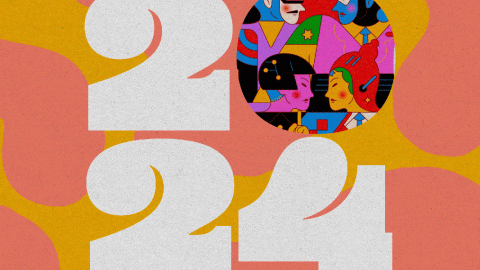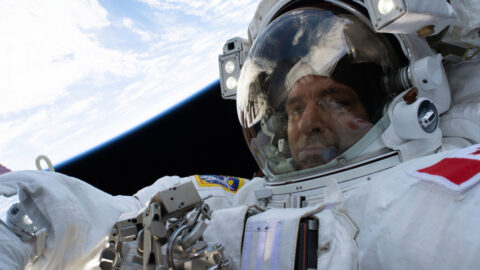I Was There When is an oral history project that’s part of the In Machines We Trust podcast. It features stories of how breakthroughs and watershed moments in artificial intelligence and computing happened, as told by the people who witnessed them. In this episode we meet one of the world’s greatest chess players, Garry Kasparov.
Sounds from:
- Garry Kasparov VS Deep Blue 1997 6th game (Kasparov Resigns) – via YouTube
Credits:
This project was produced by Jennifer Strong, Anthony Green and Emma Cillekens. It was edited by Mat Honan and mixed by Garret Lang with original music by Jacob Gorski. The art is from Eric Mongeon and Stephanie Arnett.
Full transcript:
[TR ID]
Jennifer: For as long as there’s been AI research, games have been a part of it… especially chess.
We think of people who are good at playing chess as having a certain level of intelligence … and so the game also became a way to gauge the intelligence of machines.
And… fun fact? The very first chess playing program was written before a computer even existed to run it. Pioneering computer scientist Alan Turing played it in 1950…using an algorithm worked out on paper.
It didn’t work very well. But people continued to advance this research for decades.
And then, in 1997, IBM’s Deep Blue computer beat Garry Kasparov… the reigning world champion of chess.
Commentator 2: Are we missing something on the chessboard now that Kasparov sees? He does not look.. he looks disgusted in fact.
Commentator 1: Whoah!
Commentator 2: Deep Blue! Kasparov, after the move C4, has resigned!
[Applause]
Jennifer: I’m Jennifer Strong, and this is I Was There When—an oral history project featuring the stories of breakthroughs and watershed moments in AI and computing, as told by those who witnessed them. This episode, we meet the man on the other side of that chess board, Garry Kasparov.
Garry Kasparov: It was inevitable that something described on the cover of Newsweek as the brain’s last stand and in books as big as the moon landing would involve a lot of mythology. I admit that I was caught up in a lot of this hype myself. It took years of reflection and examination to sort out my impressions then and the truth. I wrote about this painful process in my 2017 book, Deep Thinking: When machine intelligence ends and human creativity begins, it’s easy for a chess machine, after all. They don’t care if they win or lose. They don’t even know they’re playing chess. But as a human and world champion, I had many emotions sitting down across from a machine.
Garry Kasparov: Would it play like previous machines or would it play like God? I was used to reading my opponents body language. Not exactly helpful, sitting across from a computer engineer making moves he didn’t understand for the machine he’d built. I was also used to preparing deeply for my opponents based on their previous games and their tendencies. Against Deep Blue, this was also out the window as they kept their training games secret. And of course they could upgrade its strengths and change its chess personality with a few keystrokes. If only I could. It was hard to explain my experience because I was really the first knowledge worker to have my job threatened by a machine.
Garry Kasparov: Most AI and experiences before that were hoaxes, or quite primitive. For example, human elevate operators being replaced by automatic push-bat elevators was very alarming to people in the 1940s. In fact, the technology for automatic elevators had existed for decades, but people were afraid of them. Plus, the elevate operators had a strong union. Today, there are many easy comparisons. Sitting down across from Deep Blue was in one way entirely normal. I had been feeding at a chess board since I was six years old, and technically a little was different for me, and yet it was entirely different. I felt like most people will feel the first time they get into a self-driving car or get a diagnosis from an AI doctor.
Garry Kasparov: These new marvels are far beyond my chest nemesis. Of course, the machine I lost to in the 1997 rematch, sometimes called Deep Blue, was as intelligent as your alarm clock—a 10 million dollar alarm clock, but nothing like what had been imagined by previous generations. This is not to downplay their achievement, which was a Mount Everest of computing—to defeat the world chess champion . There was a reason it got global attention. I only want to put into context what we mean when we say intelligent. Deep Blue did one thing very well with hundreds of specialized chiefs, but it was enough to compete at the world champion level because chess is deep but not deep enough. Deep Blue didn’t have to solve chess. It only had to play better over six games and brute force analysis at fast speeds turned out to be enough. It took me a while to absorb the most important lessons of my loss, and they had nothing to do with chess and everything to do with the future of the human-machine relationship.
Garry Kasparov: The period in which we compete against intelligent machines is very small, almost insignificant, yet we put so much importance on it instead of the alternative machine supremacy that follows, which is what really matters. AI automation replaces human jobs, for example, and there’s a brief moment of equality in performance with humans. But that doesn’t last long, and forever after machines will do it better, cheaper, and more safely. That’s human progress. It makes our lives better. This isn’t to be callous to those who lose their jobs, but even there, study after study shows that industries with more automation and AI do better with more jobs and higher salaries. The alternative is stagnation.
Garry Kasparov: Another key point from Deep Blue that has broad applications to AI and tech in general is that we often miss the early signs of inevitable machine dominance. My loss in the 1997 rematch was a big deal, but in fact, the most important point had been already made a year earlier in our first match in 1996 in Philadelphia, which I won. But I lost the very first game of the match, and that was the writing on the wall. That made it clear that chess was not as special as everyone had thought. It was just another closed, complex system that would inevitably be cracked by increases in computer power. That’s when that little competition window started to close. Now it’s funny to think about competing with chess machines. They are our tools, not our competition. We also get better cancer screening, safer roads, greater productivity and security. We don’t have to work at many boring and dangerous jobs anymore. When that happens, we are free to become more creative, more strategic in our activities.
Garry Kasparov: We can direct the robots, the algorithms, et cetera. Technology doing our work is the whole history of human progress. This is why I prefer to call AI or augmented intelligence, not artificial. It’s a tool and makes us smarter. The way a telescope augments our vision—what matters is how we focus it. This isn’t just a matter of economics. Global security also depends on it as leading AI tech in the hands of dictatorships is a serious threat. I helped design the first PC database software that made all my handwritten notebooks of advantages obsolete. I used and helped promote the chess programs that would overtake me and everyone else. I saw them as necessary tools that would make me better. Not as threats.
Garry Kasparov: In 1998, I invented what I called advanced chess, in which humans played together with a machine partner. A true model for many kinds of collaborative AI integration today. And humans still play chess against each other all over the world more than ever. Even though the phone in everyone’s pocket now is stronger than Deep Blue. Are we using these powerful tools in a responsible way? The Wild West is romantic in cowboy movies, but progress means having laws upheld in society where we feel secured to take advantage of the technological marvels we have created. When I give lectures on AI, many expect me to be angry or a technophobe because of my loss to a machine 25 years ago. And I admit it, I am a sore loser. But really it was a fascinating experiment and experience. Mostly, I hope others learn from my attitudes. If you can’t beat them, join them. Don’t rage against the machine if you can make it work for you and for all of us.
Jennifer: Do you have a story to tell? Know someone who does? Drop us an email at podcasts at technology review dot com. You can find links to our reporting in the show notes… and you can support our journalism by going to tech review dot com slash subscribe.
[MIDROLL]
Jennifer: This project was produced by me with Anthony Green and Emma Cillekens. We’re edited by Mat Honan and our mix engineer is Garret Lang.
Thanks for Listening. I’m Jennifer Strong.




Recent Comments